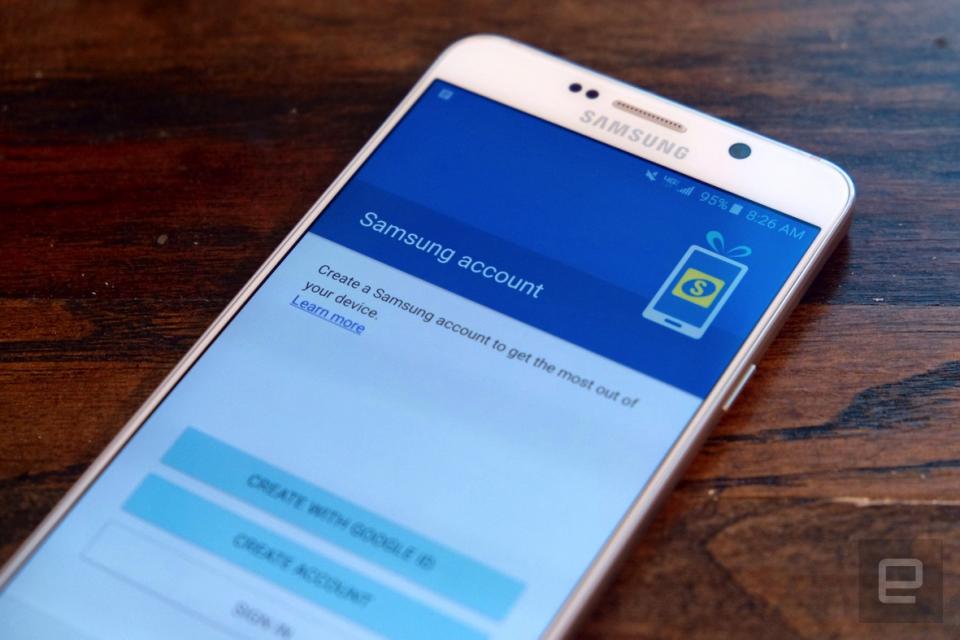Apple planned ahead for the inevitable hardware slump
The App Store, iTunes and Apple Pay will help soften the blow when iPhone sales begin to fall.

It was inevitable but nonetheless concerning to investors: iPhone sales flattened out this quarter, part of an overall trend of weakness in the smartphone market, and Apple admitted that next quarter will see sales decline year over year for the first time. Yes, the company just reported record-breaking profit -- again -- but as the iPhone goes, so does Apple. As such, the company is forecasting its first revenue decline in years.
The job of a good CEO and CFO is to spin this news and keep investors calm through a downturn, and Tim Cook and Luca Maestri gave plenty of reasons for the upcoming decline -- as well as plenty of reasons they're not worried yet. The crux of Apple's argument centered around the whopping 1 billion active Apple devices currently in use worldwide.
"A growing portion of our revenue is directly driven by our existing install base," Cook said on Tuesday. That installed base supports two of the most important messages Apple shared on Tuesday: Its users are both satisfied and loyal, and that keeps them generating revenue for the company through the wide network of services that Apple offers. Basically, the company's insistence on controlling both the hardware and software has provided Apple with a revenue source that hardware makers like Samsung and LG can't hope to duplicate.
"A growing portion of our revenue is directly driven by our existing installed base." -- Tim Cook
It starts with satisfaction, a metric that has long been important to Cook. He brought it up again this week: "Our customer satisfaction and retention rates are second to none and provide us with a long-lasting foundation," he said. Cook noted 99 percent satisfaction among iPhone 6S and 6S Plus owners, based on a survey from 451 Research. Recently he's also cited similarly impressive numbers for the iPad and Apple Watch.
That satisfaction is important for two reasons, Cook says. For one, when combined with high engagement numbers, it means customers are more likely to spend money on additional apps and content, further entrenching them in the company's ecosystem. It also means that those owners are likely to buy multiple products to get the full Apple experience. OS X, iOS, watchOS and tvOS all have ties to various degrees, and the company has long touted the benefits of owning multiple devices.

Cook and Maestri believe this is all good news for its services category, which is primarily made up of revenue from iTunes, the App Store, AppleCare, iCloud and Apple Pay. And the numbers back that up. Services revenue of $6.1 billion represented a 27 percent year-over-year increase. To put that in context, $6.1 billion is far, far less than the $51.6 billion the company made from the iPhone. But it isn't far behind Mac revenue ($6.7 billion) or even iPad sales ($7.1 billion) -- and it's growing a lot faster than either of those businesses, too. (The iPad has seen shrinking sales for two years now, but that's a story for another time.) "We have tremendously satisfied and loyal customers who are engaged with our services at a fast-growing rate," Maestri said as he summed up the impact of the services business. "All of this provides us with an unparalleled foundation for the future of Apple business."
A huge installed base of satisfied customers means Apple's sevices revenue will probably keep growing.
Of course, one can argue that Apple is a hardware company first and that the iPhone will continue to account for the lion's share of its revenue for a while yet. But Cook and company had to know that iPhone sales would flatten out eventually, even if they see it as a temporary blip rather than a lasting decline, like what happened with the iPod. With that in mind, you can look at the company's focus on services as preparation for this day: There's a piece of Apple gear out there for one in seven people, and those people who love the company's products will spend even more money to get the most use out of them.

It's a strategy Apple's hardware-focused competitors can't easily duplicate. Samsung has tried, building its own "Galaxy" of services like Samsung Pay, Milk Music, Milk VR and a host of built-in apps like S Health and S Voice. But the fact that the company gave up on Milk Video after just one year is telling. When it has to compete with Google's own bundled services right on the phone, it's hard to imagine Samsung ever relying on these features as a notable revenue source. And no other Android OEM has even tried. Everyone else is content to use Google Play.
Despite this strength, a growing services business will not make up for missed iPhone revenue. The company is headed toward the first downturn of the iPhone era, even if most companies would kill for the money Apple will make over the rest of the year. But Apple isn't expecting services to be its new savior.
Instead, Cook is focusing on Apple's diverse ways of making money. He made his mark by shipping massive amounts of product with military efficiency. Now Cook is flexing another muscle: The push into services that started in earnest with the iTunes Store back in 2003 is now nearly as big as the Mac, Apple's oldest product line. Cook is positioning this business as one not dependent on hardware sales but rather that huge base of happy customers. "We might not ship as much hardware," Apple says, soothing panicked investors, "but that's not our only way to make money."
[Lead image credit: Stephen Lam/ Getty Images]
